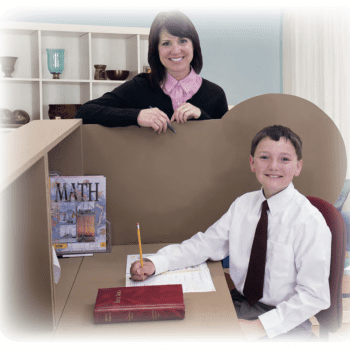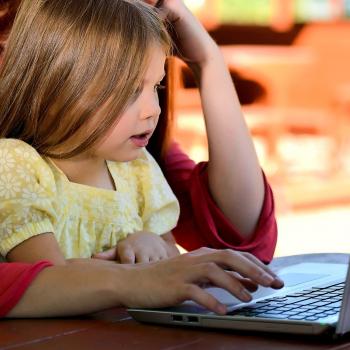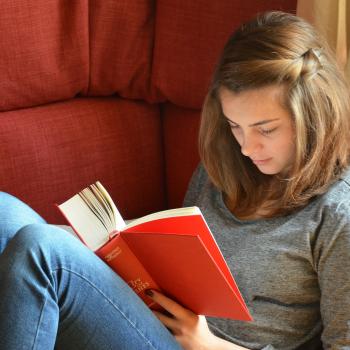Just over a year ago, I almost stopped blogging. I received such negativity in response to a blog post I had written that blogging ceased to be fun. I very nearly quit, and was only able to enjoy blogging again by changing my approach to handling comment threads. What was the post I wrote that generated such a response? It was a post in I wrote about my struggles to overcome the the serious socialization problems I faced as a result of having been homeschooled.
Something else happened after that post, though. While homeschool advocates denied my experience, I also received emails from other young people who had been homeschooled. They thanked me for giving voice to their experiences. They thanked me for letting them know they weren’t the only ones with these experiences. They thanked me for speaking out. Still, it was a long time after that first post before I dared to criticize homeschooling on this blog again. The response I had gotten on that post was too triggering for me to dare repeating too soon. I still don’t write about homeschooling very often, in large part because of this.
When I write about homeschooling, I am often accused of assuming that all homeschoolers are conservative Christians, of thinking all homeschoolers isolate and indoctrinate, of painting all homeschoolers with one brush and not realizing that they are a diverse lot, and of wanting to see homeschooling banned. I do not understand this. This happened again after last week’s post on homeschooling, so I went back and reread everything I have written on homeschooling, wondering if I wasn’t being nuanced or clear enough. To be honest, doing this left me only more confused. Allow me to quote myself.
From that original post on socialization:
Am I arguing that no one should ever homeschool? Not necessarily. I don’t know every situation, and every family is different. I would not presume to speak for every family. What I am arguing is that parents who homeschool need to take the socialization question seriously rather than laughing it off. They need to be aware of the potential socialization problems their children may face and take steps to mitigate them. Most of all, homeschool parents need to understand what socialization is and why it is important, and they need to be fully aware of what they are doing when they remove their children from the public schools.
From my main homeschooling page:
Homeschoolers are a diverse lot. Some homeschool for religious reasons, others for secular reasons. Some homeschooled children have a good deal of social interaction, others very little. Some get a first rate education, others suffer from educational neglect. Some use curricula and workbooks, others “unschool.” Some see homeschooling as a temporary option, others see it as a lifestyle.
The “Christian homeschool movement” is made up of those who homeschool in order to ensure that their children will hold specific religious beliefs and in the hope that their offspring will change America’s future direction. These homeschoolers use religious textbooks and limit their interaction to other like-minded families. Some educate well while others don’t, but all tend to see homeschooling as a requirement rather than an option.
…
While most of my criticism is aimed toward the Christian homeschool movement and the way focuses on isolating (aka “sheltering”) and indoctrinating (aka “teaching God’s truth”), I also have some critiques of homeschooling in general. I want my daughter to have teachers who are trained in their subject matter and in how to teach, I want her to have the same socialization experience as other children, and I see involvement in our local schools as part of my civic duty.
From a post last spring:
Because I see drawbacks to homeschooling and intend to send my children to public school, I am often painted as “anti-homeschooling.” But I don’t really see myself like that. In fact, I have never ruled out the possibility of homeschooling at some point in the future. After all, if public schooling somehow goes horrifically wrong for my young daughter, I will look at what other educational options were available – private school, charter school, homeschool.
…
As I raise my children I will continue to see homeschooling as an option, but only as one option among many and as an option that, like any option, has drawbacks and pitfalls alongside its pluses. And if that makes me “anti-homeschooling,” I will wear the label proudly.
And from my post last week:
Note that Jones is discussing and referring to what I generally call “the Christian homeschool movement.” There are families who pull a child out, generally for a few years at most, because she’s being bullied, or because he’s having behavioral issues, or because they’re bright and are being held back educationally, but these are not the homeschoolers Jones is talking about, and they’re not the ones I am generally talking about when I talk about homeschooling either. Jones is talking about the Christians, generally evangelicals, fundamentalists, or conservative Catholics, who pull their children out in an effort to teach them “God’s truth” away from “the influences of the world.”
My post on socialization wasn’t actually the first thing I’d written about homeschooling. In one early post on homeschooling I wrote this:
Am I saying that homeschooling is, then, wrong, or that no one should homeschool? No, not at all! I’ve seen many families where homeschooling is an absolutely wonderful thing, with happy, healthy, well-adjusted children. What I am saying is that homeschooling facilitates abuse by giving parents the ability to isolate their children and control their education in highly problematic ways. Homeschoolers need to be willing to admit this problem and address it rather than simply seeing any critique of homeschooling as a monumental threat.
After some push back in the comments on this post, I wrote a followup post:
I am not calling for making homeschooling illegal, both because that is impractical in today’s political climate and because I have seen families who do do it well. I would, however, make four points: First, we need to be aware that homeschooling is perfectly suited to be a cover for abuse. Second, we need to discuss realistic ways to regulate homeschooling in order to ensure that every child gets the education he or she deserves. Third, I think that even in families who do not abuse homeschooling, children can grow up feeling different from their peers in unpleasant ways. And fourth, I think we need to return the focus to the public schools rather than abandoning them.
Sometime later I wrote a post in which I said the following:
I don’t have a problem with homeschooling. I am perfectly aware that homeschooling can work well for many families, and that homeschooling can be freeing and can open new avenues to learning. I think every family should decide for itself what educational option is best for it, and that homeschooling is a perfectly valid option.
I DO have a problem with homeschooling being used to isolate children from other points of view (aka “shelter”), or to mis-educate children by only giving them one side of every argument (aka “teach God’s truth”). I have a problem with parents using homeschooling to control their children and stifle them. I have a problem with homeschoolers’ frequent objections to regulation of any sort (the government regulates public schools and private schools to make sure children meet basic educational requirements, and homeschoolers shouldn’t be exempt). I have a problem with the idea that homeschooling is some sort of perfect panacea that has no problems, risks, or drawbacks. I also have a problem with the idea that public schools are evil or completely broken, and that homeschooling is the best option for everyone, rather than just one of an array of educational options available to a given family.
I am honestly baffled that criticizing homeschooling brings on the response it does. It’s like my words go through some sort of filter and end up shredded.
The reality is that I have never advocated banning homeschooling. Further, I am and always have been completely aware that there are a variety of different types of homeschoolers. It’s just that I personally think that being homeschooled did me more harm than good, I see homeschooling as a mixed bag in terms of outcome, and I have some fundamental concerns about how it affects the role of civic institutions in our society. As a result, I feel very strongly about placing my children in public school. But there is a difference between criticizing something and wanting to ban it, and a difference between not wanting to participate in something and wanting to prohibit other people from doing it.
This really shouldn’t be that complicated.














